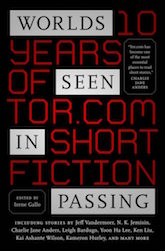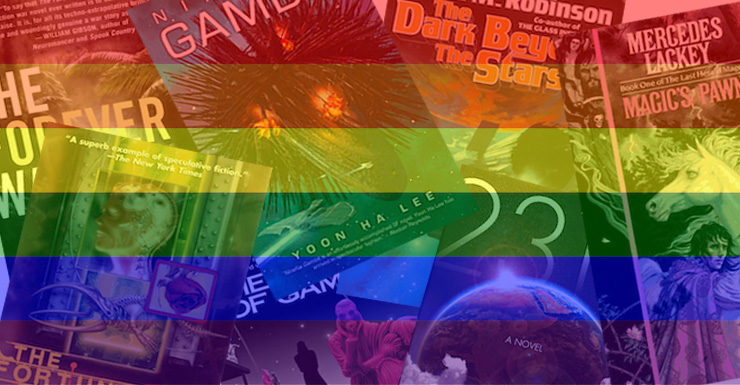Like many SF/F fans across the intersections of LGBTQ+ identities, I’m constantly on the lookout for good fiction that reflects something of my own experience. In seeking lists that recommend or simply catalogue such works, I’ve found many that, while well-intended, tend to mash an enormous body of work together without considering how authors actually deal with the content. This means that quite often, bigoted portrayals are set right next to works that feature positive representation, or else work that is as gay as possible will be set next to work with only the briefest passing mention of “non-normative” sexuality.
This raises some potentially thorny questions: How should we approach the idea of canon, in this particular set of circumstances? What should we look for when we compile lists of LGBTQ+ speculative fiction? What are we compiling for? Do we consider any mention at all? Focus mainly on positive representation? What about historical context and works by authors who identify as part of the LGBTQ+ community?
I would argue, for example, that Joe Haldeman’s The Forever War doesn’t belong on the same list as Mercedes Lackey’s The Last Herald-Mage trilogy. The Forever War uses homosexuality as a means to demonstrate just how isolated the heterosexual protagonist is when he returns home from a military campaign and finds that most everybody else is now gay; it’s suggested that homosexuality has been encouraged as a means of population control. It’s based in a homophobic anxiety about straight people being taken over by the Other, by finding that their society has been overrun and irrevocably changed. The Last Herald-Mage, on the other hand, is a traditional fantasy epic that plays out over an underlying coming out narrative. It’s a positive portrayal of a man who happens to be both gay and magical, facing all the things a fantasy protagonist faces while also coming to terms with his sexuality. The Forever War is certainly worth reading for other reasons, but I would never recommend it for its gay content. Our sympathies aren’t with homosexual people, as they are in The Last Herald-Mage. It isn’t a work of fiction for gay people—it just uses them to make an unrelated point.
We include The Forever War on these lists perhaps because there is still so little out there that we feel the need to include everything, even the remotest mention of “non-normative” sexuality or gender. That approach, the one which includes absolutely every mention, is an important archival task, but it can be harmful to a reader specifically seeking out positive portrayals—which is what I believe many of us are on the lookout for when we scroll through these lists of LGBTQ+ fiction.
Gatekeeping helps no one, and isn’t the purpose of this inquiry. Rather, it is to figure out how we might better organize and introduce readers to LGBTQ+ fantasy and science fiction. There is work that is important because of its use of LGBTQ+ context, because it approaches representation in a positive and fully-realized way, because it has an author who is part of the community, and/or because it is important for its historical context. There are some fantastic writers out there doing pieces of the work—the Gay Fiction Booklist That Doesn’t Suck and Tor.com’s own QUILTBAG+ Speculative Classics series by Bogi Takács come to mind—but we’re far from having enough power and intent behind the complete mission: to define and establish a framework of LGBTQ+ SF/F canon.
Categorization can be difficult, however, and perhaps one of the main reasons a comprehensive, organized record of LGBTQ+ speculative fiction still feels far away. For instance, I found Frank M. Robinson’s The Dark Beyond the Stars through a list I’d come across, and it is one of the most confusing novels I have read, in terms of figuring out where, exactly, it belongs. It’s a great generation ship novel about a crew in search of extraterrestrial life. There is a mad Ahab-like immortal captain, rampant literary allusions (many of the characters are named after Shakespearean characters), and a psychologically rich narrative. It’s a slow novel, character-driven, with most of the action happening to the protagonist Sparrow rather than him causing it, and it moves in tightly contained bursts of energy until its last quarter or so. The relevant detail for our discussion is that on this generation ship, sexual practices are fluid, and gender difference has been de-emphasized—basically, the sexual culture on the ship has made homo- and hetero- designations moot, and anyone can have sex with anyone else (though, interestingly, f/f relationships are barely alluded to) without judgment. Taking into account the novel’s binary assumptions about gender, this makes virtually everyone on the ship bisexual.
One might be eager to add the book to a LGBTQ+ SF reading list based on this description, but The Dark Beyond the Stars is reticent to really discuss or explore this aspect of its world. The novel has the appearance of being subversive but in fact keeps sexuality at a distance, just barely brushing up against the implications of the socio-sexual dynamics aboard the generation ship. Ultimately the characters end up mostly defaulting to monogamous heterosexual pairings, and the one homosexual experience that the protagonist has is a deeply disturbing and traumatizing event for him.
Criticisms of homophobia in the novel’s treatment of m/m relationships are certainly viable, but are further complicated by the fact of Robinson’s own homosexuality. Not to say that gay men can’t have internalized homophobia (Robinson was aware of this himself, titling his memoir the self-effacing Not So Good a Gay Man), but this brings up a different consideration in how we categorize The Dark Beyond the Stars: Sometimes fiction isn’t directly about a subject, while still being heavily informed by said subject.
Consider how Yoon Ha Lee’s experience as a transgender man informs the themes of body-possession and gender dynamics in his Machineries of Empire novels, or how Raphael Carter’s being intersex and transgender relates to the transhumanist themes of The Fortunate Fall. These books already belong in the LGBTQ+ SF/F canon for other reasons, but arguably they belong there on addition level because their authors are a part of the community.
So, does The Dark Beyond the Stars belong in the spec fic LGBTQ+ canon by dint of Robinson’s sexuality? Well, it seems like both yes and no. It doesn’t belong in the Good Representation category, maybe…but it belongs somewhere. The Dark Beyond the Stars doesn’t match up to Lee or Carter exactly either, but the comparison with those writers demonstrates that an author’s identity, and how it impacts their work, should be considered. Again, nothing is gained by gatekeeping, and the book belongs to the larger canon in part for its content alone, but also for its authorial and historical context. The Dark Beyond the Stars is an example of how an author attempted to introduce LGBTQ+ themes into their work while still suppressing said themes, bowdlerizing them to a mainstream acceptable level. The novel is still informed by Robinson’s sexuality—it’s likely that he wouldn’t have included the m/m elements into the story at all otherwise—but it’s an undeniably (and purposefully) underplayed part of the story.
Complicating our various subcategories further, we have to consider work that does directly grapple with LGBTQ+ themes, but from a cisgender, heterosexual perspective. These authors again aren’t what one might recommend to readers specifically searching for Good Representation, but they fit into one of our categories somewhere.
Buy the Book


Worlds Seen in Passing: Ten Years of Tor.com Short Fiction
Authors like Kim Stanley Robinson and Iain M. Banks, both of whom I adore, fall short in their approaches to LGBTQ+ content. Their work reflects an interest in the future of variance in gender and sexuality that seems to completely overlook that this variance already exists. Kim Stanley Robinson’s 2312, for instance, collapses and confuses gender and sexuality, at one point referring to homosexuality as a gender identity and making reference to “male lesbians.” It is also, for all its starry-eyed optimism about human progress, surprisingly conservative about pronouns: Despite most characters being intersex (“gynandromorphous” being the most commonly used term in the novel), they still tend to use he/him/his or she/her/hers.
Banks, for his part, is more playful about his speculations on gender: In The Player of Games, many side characters transition for personal amusement. It is a detail with intriguing potential, but for all his playing around with gender Banks doesn’t touch on dysphoria or any other trans-related feelings toward gender and body. The sense is that these are cis people toying with gender just because they can, because they’re living in a society in which everything is accessible and permitted. Moreover, their original sexual characteristics are still seen as more “true”—one character transitions to male and then back again off-page, giving readers the impression that this was just a kind of gender vacation that had come to an end.
All of these considerations make an already tremendous job even more daunting, as we attempt to establish the framework of an LGBTQ+ canon within the existing body of SF/F—parsing out agendas, perspectives, and details along the way. These identities are complex, intersecting, and still deeply underrepresented in fiction, but in order to build a stronger body of literature and to build a cohesive fanbase, we need to be able to access the foundations. And furthermore, we need to know what to expect from these foundations: our problematic depictions, our underplayed dynamics, our subtext, our history.
These lists are probably always going to be messy and incomplete. But if they continue to expand and break down the various approaches to LGBTQ+ identities in a more complex and thoughtful way, then we’re headed in the right direction.
Bryan Cebulski is an aspiring point-and-click adventure protagonist who writes about history, masculinity, and media. You can find him on Twitter as @BryanOnion and on Medium.










